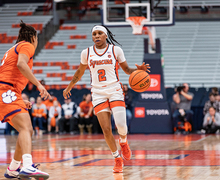Students question quality of online labs, performing arts classes
Daily Orange File Photo
Broadcast and digital journalism students and professors shared varied opinions on the effectiveness of reporting projects from home.
UPDATED: April 2, 2020 at 1:03 p.m.
Will Foohey used to participate in back-and-forth dialogue with a partner during his scene study class. Now, the class takes place through individual monologues submitted on Blackboard.
In Foohey’s voice lessons course, his professor sends students tracks of background music to sing over via FaceTime.
“I think it is going to be hard to mimic everything,” said Foohey, a freshman acting major. “Moving to individual work instead of group work is going to be beneficial, but I do think there will be the missing component of working in-person.”
SU has transitioned to online learning for the rest of the semester due to the coronavirus pandemic. The novel coronavirus causes COVID-19, a respiratory disease that has infected at least 76,049 people in New York and killed 1,714 in the state.
Students registered in courses that involve labs, in-person performances and reporting in the field told The Daily Orange they’re unsure whether their classes will be as effective remotely.
All of Jaelle Laguerre’s classes in the College of Visual and Performing Arts were canceled during the week after spring break. Her professors said they are trying to come up with a plan for moving the classes online.
“To this day, some of my classes still don’t have an answer as to what we are doing,” said Laguerre, a junior musical theater major. “Through Zoom, we’ve been trying to figure out together what we are going to do.”
Theater classes can’t be replicated in an online format and retain the same academic value, Laguerre said.
“In VPA and in theater, if you miss a day of class, you’re missing so much growth,” she said. “You cannot grow and cannot get better if you are not physically present in class. So switching over to online just limits everything so much, and there’s no way it can be the same.”
Students will be glad to return to campus after having to maneuver in-person features through online classes, Laguerre said. Colleges can take the situation as a learning experience, she added.
“This whole experience for those of us who aren’t seniors is going to make us really grateful come this fall,” she said. “I think it says a lot that some of us would literally rather be in school than wherever we are.”
Julia Catalano, a junior theater management student, said her VPA classes were easier to bring online because a majority of the semester’s content was already completed. Her theater management class, focusing on organization and fundraising, now involves assignments submitted online.
Catalano’s theater history class, however, is not as effective without a setting for group discussions, she said.
“With discussion-based classes, you can try to have that on Blackboard, but it’s not the same. You can’t really replicate those deep discussions. It’s about figuring out what are ways we can learn that isn’t us trying to make this as close to an in-person experience as possible.”
Foohey believes his professors will make the correct decisions to guide the coursework, but said he’s worried about losing the skills that the class has gained.
“It has been really stressful, especially considering the amount of work we’ve put into everything thus far,” he said. “It’s stressful to know we don’t really get to work on our scenes and we don’t really get to work in-person, work on our voice and really build up our performance skills.”
Related Stories
Meanwhile, in professor James Spencer’s forensic science course, labs no longer need to be completed to receive credit. Students have already completed a majority of the course’s in-person lab assignments, according to instructions from Spencer to students in the class.
And in professor Samuel Sampere’s general physics laboratory class, students must now complete the course’s remaining labs entirely at home, Sampere said in a notice to students enrolled in the course.
Joe Zoll, a sophomore computer science student, said assignments in his programming language class are now due at the end of the semester instead of at the end of every week. Lectures are taking place in groups online.
“It’s harder to ask questions precisely through online text as opposed to in person,” Zoll said. There’s nothing the professor can do about that. Everyone is dealing with that as part of the transition to online.”
Students and professors in the S.I. Newhouse School of Public Communications’ broadcast and digital journalism department shared varied opinions on the effectiveness of reporting projects from home.
Professor Keith Kobland’s first priority is the safety of his students. If parents are clamping down on excursions, Kobland said, he won’t urge reporting from the field.
“But I still think there’s enough that they can do,” Kobland said. “ I think you can still be a journalist around your house and be resourceful there, so that’s kind of my feeling with it.”
Kobland currently teaches BDJ 464: “Television and Digital News Reporting,” a core course in the broadcast and digital journalism curriculum, and BDJ 560: “Television News Magazine Production.” BDJ 560 produces ‘Mornings on the Hill,’ a public affairs show that airs on Orange Television Network.
He’s been flexible on what he expects of assignments in these classes. Without access to Newhouse’s cameras, students are filming and editing video packages from home. They’re using smartphones or equipment they have on hand, Kobland said, and have access to Adobe editing products on their personal devices for the semester.
“These stories done with parents, done with siblings, done with people that they’re bivouacking with, I think they can all have value,” Kobland said. “Are they ‘hard news’ stories? No, but I think they can be interesting.”
Karl Moeglein, a junior broadcast and digital journalism major, appreciates the new license to be creative in Kobland’s section of BDJ 464. With normal standards of production and content thrown out, there aren’t many limits to what he can do, he said. However, Moeglein lives in rural Oregon, and is less sure than Kobland of the value of what’s occurring around him.
“I make a package now — now in three weeks how do I make anything different? Because nothing newsworthy happens in my house,” Moeglein said.
Keren Henderson, an assistant professor of broadcast and digital journalism, has kept reporting requirements the same for students in her section of BDJ 364: “Radio and Digital Audio News Reporting.” By virtue of the medium, students are not limited in their ability to report on central New York, she said.
Henderson’s class will still be unable to spend time in one of Newhouse’s radio studios. Recording labs, where students practice mock TV stand-up shots or a short radio newscast, have moved to Zoom.
Though Henderson has kept reporting requirements stringent, she’s prioritized students’ well-being. She’s offered to make alternative arrangements for a student at home in Japan who would otherwise have to wake up at 1 a.m. to attend Henderson’s four-hour lecture.
“I’m being particularly mindful of students who have additional needs and there will inevitably be professors who have those needs,” Henderson said.
Moving to online and remote classes toward the end of the semester was a silver lining for Henderson, she said. Trying to teach an entire semester online from scratch, from afar, seems to be the most daunting task yet, and one she and her colleagues are already starting to grapple with, she said.
But for now, SU students and faculty said they’re prioritizing safety.
“The first question is ‘How do you do these things safely?’ Not ‘How do I get this story?’ Moeglein said.
CORRECTION: In a previous version of this post, a student’s home was misstated. Keren Henderson has a student who lives in Japan, not China. The Daily Orange regrets this error.
Published on April 1, 2020 at 12:06 am
Contact Richard: [email protected] | @RichardJChang1




